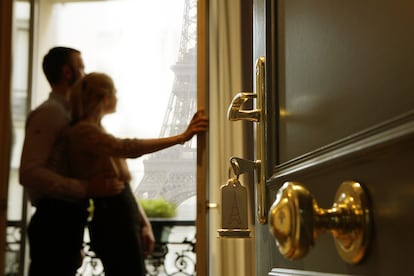The booming infidelity industry: How much it costs to have an extramarital lover (alibis included)
People having affairs usually spend between $53 and $428 per month, according to estimates by Ashley Madison


If you look at the issue from a purely economic standpoint, having a lover pays off. A divorce costs 3.6 times more than having an affair: while the average annual cost of a separation is around €16,588 ($17,783.08), keeping a lover costs €4,657 ($4,992.51), according to 2020 estimates by Ashley Madison, a dating platform for married couples that has the most users in the world at over 80 million registered users. In Spain alone, the country’s second-biggest European market, it estimates there are 1.7 million people cheating, ahead of France, Italy and Germany. In the world rankings, which include more than 40 countries, Spain is in seventh place.
Thus, the infidelity/extramarital lover market is quite seductive. Hundreds of thousands of people spend a monthly amount of money on a furtive relationship. Some shell out more than others; it depends on interest, generosity and budget. And it’s not just men. Increasingly, women are sampling forbidden fruit; in fact, in all the countries where Ashley Madison operates, female infidelity is on the rise. On that website, the ratio of active users who pay for a subscription in Spain is 0.8 women per man.
Because these relationships are secret and participants don’t make them public, it is very difficult to do a survey on how many people have a lover and how much they spend on an extramarital relationship. Still, some surveys help give an idea. In Spain, 42% of men and 31% of women have been unfaithful at some point, according to data from a 2022 survey conducted by Gleeden, a platform that specializes in adulterous encounters and has 11 million users worldwide. Gleeden bills itself as a privileged space to safely find other unfaithful people from all over the world, “whether you are looking for an extramarital affair close to home or a lover thousands of miles away during your travels.”
Beyond the moral issues of having an affair, it requires nerves of steel, a good memory and prudence, as well as setting aside a budget for travel and gifts, especially flowers, chocolates, lingerie and sex toys, the items unfaithful people buy the most.
The average annual budget Ashley Madison estimated for its users is distributed among hotels (€1,944/$2,084), restaurants (€618/$662), gifts (three a year, €408/$437), and gym, clothing, beauty and personal care products (€600/$643). On this list of outlays, the company highlights two important items: flowers for the main partner (once a month, €640/$686) and special gifts, also for the official partner (two a year, €351/$376). It is worth noting that a sign that one’s partner is cheating is that he or she becomes more detail-oriented.
Gleeden has its own cost estimate. Some 26% of cheaters (80% men and 20% women) say they have an allotted amount (16% answer yes and 10% say it depends on the month) to spend on time with their lover, although they do not make large investments, according to a survey done by the company this September. Most spend between €50 ($53) and €150 ($160) per month, and few (4%) pay more than €500 ($536) per month. When it comes to paying for hotel stays, most people spend between €100 ($107) and €300 ($321) per month.
Adulterers try to throw money at the problem. However, according to a study by Dylan Selterman, associate professor in the department of psychology at Johns Hopkins University in Baltimore, Maryland, cheaters do not usually feel remorse or regret their affairs. Moreover, most consider the extramarital affair to be a positive for the couple. According to a study by Ashley E. Thompson, Delaney Wilder and Danica Kulibert (2021), the motivation for cheating has nothing to do with a lack of romantic love for the primary partner but rather a lack of sexual satisfaction. In fact, they believe that their primary relationship improves somewhat, or even a lot, as a result of their affairs.
Justifying one’s absence
But a weekend of sex and debauchery out of town doesn’t only require paying for the hotel. Although it may seem like something out of a movie, a considerable number of people who cheat hire companies to provide alibis. These companies put together evidence that makes it plausible that an adulterer’s absence from the family home is because of work. Creating an alibi for a secret getaway weekend costs between €150 ($160)and €250 ($267), depending on the complexity of the task. All alibis are unique and tailor-made for the client.
According to the company Coartada, an agency founded 25 years ago in Germany that arrived in Spain two years ago, “we have an average of one to five clients a day in Spain. There are many more in Germany because we are better known there,” says Laura González. The company believes that platforms for having sex or flirting (Tinder, OnlyFans...) have helped the growth of its business.
Founded by Stefan Eiben, the firm that creates false alibis has been helping customers lead a double life for over two decades, allowing them to “enjoy their affair for many years without stress. To do this, we use companies, who are our partners, and real actors.”
The unfaithful can hire the services for an erotic and festive weekend, as well as for a quick evening or even for a vacation with their lover. “People want to satisfy their sexual needs without jeopardizing their marriage,” adds Gonzalez. Indeed, it is precisely the lack of sexual desire for their official partners that drives cheating in the first place. Alibis usually work. But in the event of being found out, the situation can be salvaged by resorting to a lie detector test, for example. “The results are fake,” says González.
While the profile of people who cheat and resort to these tricks is heterogeneous, most of them are between 30 and 60 years old. Half of the clients are women. “There are housewives, police officers, lawyers, businesspeople, preachers, the unemployed, celebrities and employees,” this company says. That group simulates perfect couples.
Sign up for our weekly newsletter to get more English-language news coverage from EL PAÍS USA Edition
Tu suscripción se está usando en otro dispositivo
¿Quieres añadir otro usuario a tu suscripción?
Si continúas leyendo en este dispositivo, no se podrá leer en el otro.
FlechaTu suscripción se está usando en otro dispositivo y solo puedes acceder a EL PAÍS desde un dispositivo a la vez.
Si quieres compartir tu cuenta, cambia tu suscripción a la modalidad Premium, así podrás añadir otro usuario. Cada uno accederá con su propia cuenta de email, lo que os permitirá personalizar vuestra experiencia en EL PAÍS.
¿Tienes una suscripción de empresa? Accede aquí para contratar más cuentas.
En el caso de no saber quién está usando tu cuenta, te recomendamos cambiar tu contraseña aquí.
Si decides continuar compartiendo tu cuenta, este mensaje se mostrará en tu dispositivo y en el de la otra persona que está usando tu cuenta de forma indefinida, afectando a tu experiencia de lectura. Puedes consultar aquí los términos y condiciones de la suscripción digital.








































